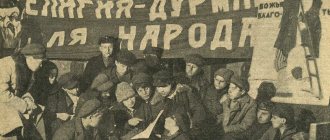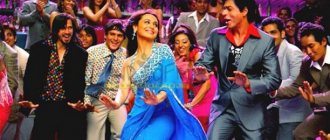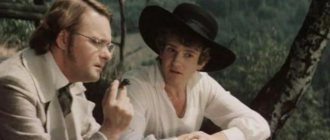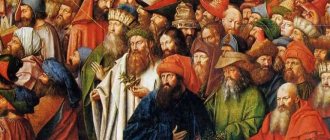A sage and a simpleton, a cunning and unmercenary, a philosopher and a joker - all this is Khoja Nasreddin, a semi-legendary personality (historians are still arguing about whether a person with that name really lived in the 13th century, or whether Nasreddin is some kind of collective image), perhaps , the most popular folklore character throughout Central Asia and the Middle East. Such are the anecdotes about him - sometimes subtle and sarcastic, sometimes simple and even rude, but always filled with wonderful Eastern wisdom.
Sermon in the mosque
One day, Khoja Nasreddin ascended the pulpit in Akshehir and addressed the believers: “Do you know what I will tell you now?” “No, we don’t know,” answered the believers. Then the Khoja said: “If you don’t know, then why should I tell you anything?” After which he left the pulpit and set off on a long journey.
Time passed, and the Khoja again ascended the pulpit and asked the faithful the same question. “We know,” the believers answered Nasreddin. “Well, if you know, then I don’t need to talk,” said the Khoja and left again. The faithful were amazed at the Khoja's words, but decided that when he asked his amazing question again, they would answer: “Some of us know, but others don’t.”
And again the Khoja ascended the pulpit, and for the third time addressed the people with his question. “Some of us know, others don’t,” was the answer. And then the Khoja, whose face was completely serious, exclaimed: “Wonderful! If so, then let those of you who know tell those who don’t.”
[edit] See also
- Kozma Prutkov
- Enver Hoxha
| [ + ] Khoja Nasreddin has something to do with writing, but you didn’t force it? | |||||||||||||||||
| |||||||||||||||||
Khoja works in the garden
One morning, Khoja climbed into someone else's garden and put everything that came to his hand - melons, watermelons, carrots, turnips - into his bag. Suddenly a gardener appeared and shouted: “What are you doing here?” The frightened Khoja answered in embarrassment: “I was thrown here by a strong storm last night.” - “Okay, well, who tore this?” – the gardener asked and pointed to what the Khoja had in his bag. “The storm tossed me from side to side, and everything I grabbed ended up in my hands.” - “Who then put all this in the bag?” “That’s exactly what I’m thinking about,” answered the Khoja.
LiveInternetLiveInternet
Quote from igorinna's message
Read in full In your quotation book or community!
Good jokes by Khoja Nasreddin
Everyone has heard something about Khoja Nasreddin. His name is remembered in friendly conversations, in political speeches, and in scientific disputes. They are remembered for various reasons, or even for no reason at all, simply because Khoja has been in all conceivable and inconceivable situations in which a person can find himself: he deceived and was deceived, he was cunning and got out, he was immensely wise and a total fool. And for almost a thousand years he has been joking and mocking human stupidity, self-interest, self-righteousness, and ignorance. And it seems that stories in which reality goes hand in hand with laughter and paradox are almost not conducive to serious conversations. I won’t argue, but I suggest looking at our hero differently.
Biography that never happened
Khoja was born into the family of a venerable imam (the head of the Muslim community) in the Turkish village of Horto in 605 AH (1206). However, dozens of villages and cities in the Middle East are ready to argue about the nationality and place of birth of the great cunning man. They say that Turkish researchers insisted on their version, although they had absolutely no grounds. They just decided so, that's all. Quite in the spirit of Nasreddin himself.
There is even more confusion regarding the date of death. It can be assumed that if a person was born in an unknown place, then he died in an unknown place. However, dear reader, there is a grave - somewhere near the city of Aksehir. And even the date of death is indicated - 386 AH (993). That is, Khoja died two hundred years before his birth! Nevertheless, some, seriously armed with the method of Nasreddin himself, decided that it would be more correct to read the date of death the other way around - not 386, but 683 AH (1284/85)! It was somewhere in these centuries that our hero got lost. In a word, whether Khoja was born or not, lived or didn’t live, died or didn’t die, it’s not very clear. Complete bewilderment and incident. And don’t laugh or cry—just shrug your shoulders. Only one thing is known for certain: Nasreddin began making fun of human weaknesses, without paying attention to ranks and titles, from childhood: In a maktab, an elementary Muslim school, little Afandi asked his teacher, the domullah, tricky questions. The domulla simply could not answer many of them. “Don’t brag about your knowledge,” the domulla got angry. - Most often, children with a sharp mind grow up to be absolute idiots. “So you, dear teacher, were probably very smart as a child.”
If you start looking in the past for a person similar to Nasreddin, it will very soon become clear that his historicity borders on legendary. It is not clear whether it was the scientist Mohammed Nasreddin, who lived during the time of Caliph Harun al-Rashid - he, being sentenced to death for his beliefs, pretended to be crazy and began to ridicule his enemies; or it was the famous Azerbaijani scientist Haji Nasireddin Tusi, who lived in the 13th century... However, this is not the point, dear reader. Traces of Khoja need to be looked for not in historical chronicles and burial crypts, which, judging by his character, he did not want to get into. And in those parables and anecdotes that were told and are still being told by 23 peoples of the Middle East and Central Asia, and not only them.
Profession "Khoja Nasreddin"
Folk tradition portrays Nasreddin as truly multifaceted. Sometimes he appears as an ugly, unsightly man in an old, shabby robe, in the pockets of which, alas, there are too many holes for anything to be stored there. Why, sometimes his robe is simply greasy with dirt: long travels and poverty take their toll. Another time, on the contrary, we see a person with a pleasant appearance, not rich, but living in abundance. In his house there is a place for holidays, but there are also dark days. And then Nasreddin sincerely rejoices at the thieves in his house, because finding something in empty chests is real luck.
Khoja travels a lot, but it is not clear where his home is: in Akshehir, Samarkand, Bukhara or Baghdad? Uzbekistan, Turkey, Afghanistan, Kazakhstan, Armenia, Azerbaijan, Greece, Bulgaria are ready to shelter him. His name is declined in different languages: Khoja Nasreddin, Jokha Nasr-et-din, Mulla, Molla (Azerbaijani), Afandi (Uzbek), Ependi (Turkmen), Nasir (Kazakh), Anasratin (Greek). Friends and students are waiting for him everywhere, but there are also plenty of enemies and ill-wishers.
He has a wife, son and two daughters. The wife is a faithful interlocutor and an eternal opponent. She is grumpy, but sometimes much wiser and calmer than her husband. His son is completely different from his father, and sometimes he is just as cunning and troublemaker.
Khoja has many professions: he is a farmer, a merchant, a doctor, a healer, he even makes a living as a theft (most often unsuccessfully). He is a very religious person, so his fellow villagers listen to his sermons; he is fair and knows the law well, so he becomes a judge; he is majestic and wise - and now the great emir and even Tamerlane himself want to see him as his closest adviser. In other stories, Nasreddin is a stupid, narrow-minded person with many shortcomings and is sometimes even considered an atheist.
It seems that Nasreddin is a manifestation of human life in all its diversity, and everyone can (if they want) discover their own Nasreddin. There is more than enough for all of us, and there will still be some left over! If Hodja were to live in our time, he would probably drive a Mercedes, work part-time at a construction site, beg in subway passages... and all this at the same time!
A different approach to life
O reader, this heap of stories about our hero, filled with pearls of jokes and diamonds of wisdom, cannot be compared with anything! Khoja Nasreddin is a special approach to life. A direct and joyful look at circumstances that cannot always be changed and which, alas, are not always favorable.
One fine morning Khoja was walking home. Suddenly it occurred to him that he could shorten his path by turning off the dusty road and walking the rest of the way through the forest. - Great day, happy searching day! - Khoja Mulla exclaimed, turning into the thicket. Before he had time to look back, he found himself at the bottom of a disguised wolf pit. “It’s good that I took a shortcut,” Mulla thought, lying on the ground. “If this trouble could happen in the midst of such beauty, then anything could happen on a dusty and boring road.”
One day, a man fell from the roof of a house right on Nasreddin’s head as he was walking along a narrow alley. Nothing happened to this man, but Mulla ended up in the hospital. One of Nasreddin’s students asked him: “What lesson did you learn from this incident, master?” - Give up the belief in inevitability, even if cause and effect seem inevitable! Avoid theoretical questions like this: “Will a person break his neck if he falls from a roof?” He fell and I broke my neck!
But if some circumstances, no matter how hard you try, cannot be avoided, you can always learn something from them, become a little wiser, and therefore much freer from these very circumstances! Or maybe at the same time it will be possible to teach someone else... or teach someone a lesson. Well, since life itself hasn’t taught us anything! He will definitely not rust behind Nasreddin, even if the devil himself is in front of him.
- How can you compete with me? - Mulla Nasreddin said to the devil. - Everyone will deceive you. Do you want me to take you to the river and bring you back without letting you drink? The devil agreed, and they went to the river. When they approached the shore, Mulla Nasreddin turned around and asked: “Where are the witnesses?” - What witnesses? - What kind? You will say that you drank water, and I will say that you did not. What's the point of this? “Well, let’s go get the witnesses,” said the devil, and they went back. — Were we at the river? - Mulla Nasreddin asked the devil when they returned. “We were,” answered the devil. — Have you drunk some water? - No. - So what else do you need?!
There are other stories in which Hoxha appears as a short-sighted person, relying on random phenomena, as if it were a law. And nothing works out for him. A random passer-by, a traveler, a teahouse owner, an emir laugh heartily, and we laugh too.
Nasreddin was digging holes in the steppe. A passerby asked him: “What are you doing here?” “Yes, I buried money in this steppe,” Nasreddin answered, “but no matter how hard I try, I can’t find it.” “Didn’t you leave any marks?” - asked a passerby. - But of course! - Nasreddin answered. - When I buried the money, there was a shadow from a cloud in that place!
A person always expects that tomorrow will be a continuation of today, although no one promised him this. And who will argue that when Khoja buried his money, the shadow of the cloud was in exactly that place?! It’s just that life is full of changes, and someone still uses last year’s calendar. Alas! Oh, our vain hopes! And yet, the man is so predictable!..
One day Molla was eating raisins. A friend came up to him and asked: “Molla, what are you eating?” “So...” answered Molla. - What do you mean, “so”? What kind of answer is this? - I'm keeping it short. — That is, how “short”? - You ask me what I eat. If I say: “Kishmish”, you will say: “Give it to me too.” I will say: “I won’t give it.” You will ask: “Why?”, and I will answer: “So...” That’s why I say briefly in advance: “So...”
But in the midst of the fun, no, no, and a painful note will sound, and then the funny suddenly ceases to be so, and we begin to look at life with different eyes.
Nasreddin says to his friend: “Did you hear that?” Our friend died. “No,” he answered. - From what? “The poor guy didn’t know what he was living for, so there’s nothing to say about the cause of death.”
And this... however, we will refrain from commenting. After all, you know, dear reader, that if you explain the meaning of the anecdote just told, nothing will remain of it, the special flavor of a story with an instructive meaning will turn into a dull statement of fact. Same with Nasreddin. Don't comment! Don't explain! Don't tempt the Almighty! Better re-read... and tell someone else.
One of Nasreddin’s relatives came from afar and brought him a duck as a gift. The delighted Nasreddin cooked it and ate it with his guest. Soon after this, people began to come to Nasreddin one after another, calling themselves friends and friends of friends of the man who brought the duck, but none of them brought new gifts. In the end, Mulla lost his temper, but then another stranger appeared: “I am a friend of a friend of a friend of the relative who brought you the duck,” he said and, like the others, sat down at the table waiting for food. Nasreddin brought him a plate of hot water. - What it is? - asked the guest. “This is soup from the duck that my relative brought,” Nasreddin answered.
Seven stories for inspiration
Khoja Nasreddin is often depicted riding a donkey backwards. The image is quite apt, because it is very difficult to convey the unpredictable style of the respected Nasreddin. And the story is this. One day, several future students came to Nasreddin and asked him to give them a lecture. “Okay,” he said, “follow me.” Obeying the order, everyone lined up in a chain and followed Nasreddin, who was sitting backwards on his donkey. At first, the young people were somewhat embarrassed by this circumstance, but then they remembered that they should not question even the most incredible actions of the teacher. However, in the end they could no longer bear the ridicule of passers-by. Feeling this, Mulla stopped and looked at them. The bravest of them approached Nasreddin: “Mulla, it’s not entirely clear to us why you are sitting on the donkey backwards.” “It’s very simple,” said Nasreddin. “You see, if you walked in front of me, it would be disrespectful to me, and if I drove with my back to you, it would be disrespectful to you.” Thus, this is the only possible compromise.
For the Arab tradition, Nasreddin is not an accidental character. It’s no secret that every fable or anecdote about him is a storehouse of ancient wisdom, knowledge about the path of man, his purpose and ways of achieving true existence. And Hoxha is not just an eccentric or an idiot, but one who, with the help of irony and paradox, is trying to convey high religious and ethical truths. Nasreddin is a real Sufi! Sufism is an internal mystical movement in Islam that developed along with official religious schools. However, the Sufis themselves say that this movement is not limited to the religion of the Prophet, but is the grain of any genuine religious or philosophical teaching. Sufism is the desire for Truth, for the spiritual transformation of man; this is a different way of thinking, a different way of looking at things, free from fears, stereotypes and dogmas. And in this sense, real Sufis can be found not only in the East, but also in Western culture. The mystery that shrouds Sufism, according to its followers, is not connected with any special mysticism and secrecy of the teaching, but with the fact that there have not been so many sincere and honest seekers of truth in all centuries. “To be in the world but not of the world, to be free from ambition, greed, intellectual arrogance, blind obedience to custom or awe of superiors—this is the ideal of the Sufi,” wrote Robert Graves, an English poet and scholar.
In our age, accustomed to sensations and revelations, these truths pale in comparison to stories of mystical miracles and global conspiracy, but these are exactly what the sages talk about. And with them Nasreddin. The truth is not somewhere around the corner, it is here, hidden behind our habits and attachments, behind our selfishness and stupidity. The image of Khoja Nasreddin, according to Idris Shah, is an amazing find of the Sufis. Khoja does not lecture or rant; there is nothing far-fetched in his antics. Someone will laugh at them, and someone will learn something and realize something thanks to them. Stories live their own lives, wandering from one people to another, Khoja travels from anecdote to anecdote, the legend does not die, wisdom lives on. Truly, it would be difficult to find a better way to convey it!
The Emir sent Nasreddin to investigate the various teachings of Eastern mystical teachers. They all told him stories of miracles, repeated the sayings of the founders of the teachings and great teachers who died a long time ago. When Nasreddin returned home, he presented a report that contained one single word: “Carrot.” He was called for an explanation. Nasreddin said to the emir: “The best part is buried; few people know that under the green, underground, there is orange and that if you do not work for it, it will spoil; A large number of donkeys are involved in this.
Sufi Jalal ad-din Rumi described the real sage in this way: “Drunk without wine, full without food; distraught, forgetting about food and sleep; the king wearing simple clothes; treasure in ruins; not from air and not from earth, not from fire and not from water; boundless sea. He has a hundred moons and suns. His wisdom was not taken from books, the truth made him wise.” A Sufi is an eccentric, intoxicated with the wine of wisdom, a person who lives according to other, heavenly criteria. Khoja Nasreddin is the same “madman”, living by genuine values that are inaccessible to the “reasonable” man in the street, whose mind is shackled by illusion. For a layman, a sage is a “fool” who does not understand anything in life.
At one meeting there was talk about the decline of morals. “If this continues, the world will turn upside down!” - exclaimed one of those present. Before he could finish, Nasreddin remarked: “Who knows, maybe the bottom will be better than the top!”
Nasreddin constantly reminds us that we are limited in understanding the essence of things, and therefore in assessing them. Oh, most attentive of readers, do not rush to be offended if you are called a fool, for Khoja such an accusation would be the highest of praises! Nasrudin is the greatest teacher, his wisdom has long crossed the boundaries of the Sufi community. But few people know Khoja like this. In the East there is a legend that says that if you tell seven stories about Khoja Nasreddin in a special sequence, then the person will be touched by the light of eternal truth, bestowing extraordinary wisdom and power. How many there were who, from century to century, studied the legacy of the great mockingbird, one can only guess. A whole life can be spent searching for this magical combination, and who knows if this legend is not another joke of the incomparable Hoxha?
Erema or Nasreddin?
Here in Russia, the “official” appearance of Nasreddin is associated with the publication of “The History of Turkey” by Dmitry Cantemir during the time of Peter I, which included the first anecdotes about our hero (Europe met Hoxha much earlier). The subsequent, unofficial existence of the great Khoja is shrouded in fog. Judge for yourself. Once, leafing through a collection of fairy tales and fables collected by folklorists in Smolensk, Moscow, Kaluga, Kostroma and other regions in the 60-80s of the last century, I found several anecdotes that exactly repeated the stories of Khoja Nasreddin.
Foma says to Erema: “I have a headache, what should I do?” “When my tooth hurt, I pulled it out,” answered Erema.
And the same.
- Afandi, what should I do, my eye hurts? - a friend asked Nasreddin. “When I had a toothache, I couldn’t calm down until I pulled it out. “You probably need to do the same, and you will get rid of the pain,” Hoxha advised. It turns out there is nothing unusual about this. Similar jokes can be found, for example, in the German legends about Till Eulenspiegel, in Boccaccio's Decameron, and in Cervantes' Don Quixote. Of course, it is difficult to say that stories about Khoja Nasreddin influenced the appearance of similar stories in other cultures. In some places this is obvious to researchers, but in others it is not possible to detect visible connections. But you must agree, dear reader, there is something extremely important and attractive in this. Knowing nothing about Nasreddin, we also know nothing about ourselves, about those depths that are being reborn in us, whether we live in Samarkand of the 14th century or in a modern European city. Truly, Khoja’s immeasurable wisdom will outlive us all, and our children will laugh at his tricks just as our grandfathers and great-grandfathers once laughed at them. Or maybe they won’t... As they say in the East, everything is the will of Allah!
When there is nothing to lose Of course, there will definitely be someone who will say that Nasreddin is incomprehensible or simply outdated. Well, if Khoja had happened to be our contemporary, he would not have been upset: you can’t please everyone. Yes, Nasreddin did not like to be upset at all. The mood is like a cloud: it came and flew away. We are upset only because we are losing what we had. But think about it, O most thoughtful of readers, do we really have that much? There is something wrong when a person determines his dignity by the amount of accumulated property. After all, there are things that you can’t buy in a store: intelligence, kindness, justice, friendship, resourcefulness, wisdom, finally. Now, if you have lost them, then there is something to be upset about. Otherwise, Khoja Nasreddin has nothing to lose, and this is perhaps his most important lesson.
Rudolf Ernst is an Austrian orientalist artist.
“Tomorrow will be the end of the world”
Khoja had a lamb. Khoja never parted with him, looked after him and loved to play with him. But one day, Khoja’s friends decided to deceive Khoja and take away his lamb. “Not today or tomorrow will be the end of the world. What will you do with the lamb? Let's eat it!" - said one of them. Khoja ignored these words. Then another friend came and began pestering me with the same words. Khoja drove him away too. But his friends continued to pester him.
In the end, Khoja Nasreddin got tired of this, and he decided to slaughter a lamb and have a feast. So they slaughtered the lamb, lit a fire, and the Khoja began to turn the carcass over the fire. His friends took off their clothes, left them with the hodja and went to have some fun.
Seeing this, the Khoja became upset and threw his friends’ clothes into the fire. When they returned, they saw that only a handful of ashes remained from their clothes. “How so, Khoja, who did this?” - they shouted. To which the Khoja said: “Well, why are you worried? You yourself said that tomorrow will be the end of the world. If so, then why do you need clothes?”
"The boiler is dead"
One day the Khoja borrowed a boiler from a neighbor. When it was time to return the cauldron, he placed a small frying pan in the middle. "And what's that?" - asked the owner. “It was your cauldron that gave birth,” said the Khoja. The neighbor was delighted and took the frying pan for himself.
Time passed, and Nasreddin again asked his neighbor for a boiler. The owner waited for a long time for Nasreddin to return his boiler to him, and finally could not stand it. “Give me back the cauldron,” he demanded from the Khoja. “I must tell you sad news,” Nasreddin answered him, “your boiler is dead.” The neighbor, surprised, tried to object: “Where have you seen boilers die?” To this the Khoja replied: “If you believed that a cauldron can give birth, then why don’t you believe that it can die?”
“If the fur coat is honored, let the fur coat eat!”
One day, rich people invited Khoja to a dinner party. He put on a shabby dress, and no one paid attention to him. Then he quietly got out from behind the table, came home, put on luxurious clothes, threw on another fur coat and returned. The owners of the house respectfully greeted Khoja and seated him at the table of honor. “Please, Khoja, taste it!” - they said, pointing to the dishes, the mere sight of which made the faithful salivate. In response to this, the Khoja brought the dish to the sleeve of his fur coat: “Please, fur coat!” - “What are you doing, Khoja?” – the owners were surprised. “If the fur coat is respected, let it eat,” said the Hodja.
[edit] Examples of trolling
| Nasreddin, for a small fee, promises one merchant to make him fabulously rich through magic and sorcery. To do this, the merchant only had to sit in the sack from dawn to dusk without food or drink, but most importantly: during all this time he must never think about the monkey, otherwise everything would be in vain. |
| Nasreddin carried his donkey, loaded with baskets of straw, across the border every day. Since everyone knew that he was a smuggler, border guards searched him from head to toe every time he returned home. They searched Nasreddin himself, examined the straw, immersed it in water, and from time to time even burned it, and Nasreddin himself lived better and better. In the end, he retired and moved to live in another country. Many years later he was met by one of the customs officers. He said: “Now you have nothing to hide, Nasrudin. Tell me what you were carrying across the border when we couldn’t catch you?” “Donkey,” Nasreddin replied. |
| Nasreddin scattered handfuls of bread around his house. Someone asked him: “What are you doing?” - I'm driving away the tigers. - But there are no tigers around! - Do you see how well it works? |
| Nasreddin says that he once made a bet with the emir of Bukhara that he would teach his donkey theology so that the donkey would know him no worse than the emir himself. This requires a purse of gold and twenty years of time. If he does not fulfill the terms of the dispute, his head is off his shoulders. Nasreddin is not afraid of the inevitable execution: “After all, in twenty years,” he says, “one of the three of us will definitely die - either the emir, or the donkey, or me. And then go figure out which of the three of us knew theology better!!” |
| - Khoja, they’re bringing pilaf! - Why should I... - So they’re bringing it to you! - What do you care?! |
| At one wedding, Nasreddin found himself next to a stranger who greedily grabbed handfuls of sugar, candies and all sorts of sweets and stuffed them into his pockets. “It’s me, son,” he justified himself, looking at Nasreddin. — Gifts from a wedding feast are especially pleasant for children, aren’t they? Then suddenly Nasreddin poured a full kettle of hot tea into his pocket. - Uh, what are you doing, my dear! - the greedy guest screamed. - When your son eats so many sweets, he will undoubtedly want to drink! |
| One day, a neighbor came to Nasreddin and asked him for ten-year-old vinegar. Hoxha refused. - But you have ten-year-old vinegar! - the neighbor was offended. “You’re a strange man,” Khoja replied, “do you think my vinegar would last ten years if I gave it to everyone who asked?” |
He is credited with inventing the inversion method:
| Khoja walked with a friend past the minaret and the friend asked: “I wonder how they make them?” - Don’t you know? Oh you! - Khoja noted. - It’s very simple: they turn the wells out... |
The trick is that wells in Central Asia were a necessity, and if the well dried up, travelers who came to it could die without receiving the water they hoped for. So this is not only an inversion, but also a mockery of religion.
Fiercely, furiously hates copying:
| Once, at the bazaar, Khoja saw a fat teahouse owner shaking some beggar tramp, demanding payment from him for lunch. - But I just smelled your pilaf! - the tramp justified himself. - But the smell also costs money! - the fat man answered him. “Wait, let him go - I’ll pay you for everything,” with these words Khoja Nasreddin approached the teahouse owner. He let the poor guy go. Khoja took several coins out of his pocket and shook them over the teahouse owner's ear. - What is this? - he was amazed. “I paid for the smell of your dinner with the jingle of my coins.” - Khoja answered calmly... |
Formulated the principle of invariance:
| One day, in the company of friends, Khoja began to complain about his old age. “True, this didn’t affect my strength at all,” he suddenly noticed, “I’m just as strong as I was many years ago.” - How did you know that? - they asked him. — We have had a huge stone in our yard for a long time. So, when I was a child, I couldn’t lift it, in my youth I couldn’t lift it either, and I can’t even now... |
Trolled representatives of the clergy:
| One day a certain righteous dervish-melami said to Nasreddin: “Khoja, is your occupation in this world just buffoonery and there is nothing virtuous and perfect in you?” - Well... what is perfect about you, dervish? - Khoja answered. “I have many talents,” he answered, “and my virtues are countless.” Every night I leave this mortal world and fly up to the limits of the first sky; I soar in the heavenly abodes and contemplate the wonders of the kingdom of heaven. - Isn’t there a heavenly breeze blowing across your face at this time? - Khoja noted. - Yes Yes! - the dervish happily picked up. “So, this is the fan - the tail of my long-eared donkey...” Nasreddin smiled. |
Trolled to the point of absurdity:
| One day a neighbor comes to Nasreddin to ask him for a donkey for a while: “Khoja, be a good neighbor, help when I need it, give me your donkey for a while!” “Well, I don’t have it,” Khoja answered. And then a donkey’s cry comes from Nasreddin’s house. “That’s what kind of person you are,” said the neighbor, “you say that there is no donkey, although you yourself hide the donkey at home.” - I? - Nasreddin was offended, - You better look at yourself! You believe some donkey, but you don’t believe me... |
The character is immortalized in monuments in Bukhara, Ust-Kamenogorsk, Moscow and the Turkish city of Aksehir.
Khoja matchmaker
One day Khoja Nasreddin wanted to sell his cow. Many times he took the cow to the market, but to no avail. A friend came across him: “Are you selling a cow?” And the Khoja responded: “I’ve been walking around since this morning, praising her as best I can, but no one even looked at her.” Then the friend started shouting: “Pregnant cow, who needs a pregnant cow, in the sixth month!” And then a buyer was found and bought the cow for a lot of money. The surprised Khoja thanked his friend and, rejoicing at the unexpected luck, went home.








